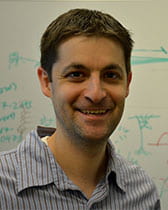$8.9 million awarded for three-year study “Redefining Parkinson’s disease pathophysiology mechanisms in the context of heterogeneous substantia nigra neuron subtypes.”
November 1, 2021

The ASAP Collaborative Research Network, a program of the Aligning Science Across Parkinson’s (ASAP) initiative being implemented through The Michael J. Fox Foundation, has awarded $8.9 million for the three-year study, “Redefining Parkinson’s disease pathophysiology mechanisms in the context of heterogeneous substantia nigra neuron subtypes.” This study is a collaboration of researchers from Feinberg School of Medicine and Weinberg College of Arts and Sciences at Northwestern, and University of California San Diego.
Rajeshwar Awatramani, PhD, professor of Neurology in the Division of Movement Disorders at Feinberg, is the Coordinating Lead PI on the study. Daniel Dombeck, PhD, professor of Neurobiology at Weinberg College is one of the Co-Investigators on the core team that also includes Co-Investigators Loukia Parisiadou, PhD, assistant professor of Pharmacology; Mark Bevan, PhD, professor of Neuroscience; and Surmeier at Northwestern; and Thomas Hnasko, PhD, at University of California San Diego.
Parkinson’s Disease is caused by the degeneration of a specific type of neuron in the brain–dopamine neurons. It was thought for many years that the population of dopamine neurons was homogenous, but the team’s recent research has demonstrated that not all dopamine neurons are the same and there are subtypes that have different functions–some may promote movement, while others oppose movement.
“Our work will identify which dopamine neuron subtypes degenerate and which circuits are dysregulated in Parkinson’s disease. This knowledge will be important for understanding and optimizing therapies, such as deep brain stimulation, that are aimed at restoring normal circuit function,” explained Professor Awatramani. “Second, our studies will identify the molecular targets of the hyperactive LRRK2 enzyme, which will be critical for the optimization of LRRK2 inhibitor drugs and their application in patients.”
This study’s hypothesis is that selective loss of pro-motor neurons in Parkinson’s Disease causes an imbalance in dopamine neuron subtypes that underlies the motor symptoms of the disease. This newly funded project will use the full toolkit of modern neuroscience to test this hypothesis, from genetic labeling with fluorescent activity indicators, to microscopy in behaving mice. Ultimately, this research may identify molecular targets that will be critical for the optimization of drugs and their application in patients.
“It’s really an honor to receive this award and I’m very excited about the research that my collaborators and I will do over the next several years with this funding. We have exciting new ideas about the changes in the brain that might lead to Parkinson’s Disease and this funding will let our interdisciplinary team test those ideas,” said Professor Dombeck. “The work that we have proposed would not be possible without all team members, working across different schools at Northwestern (Weinberg and Feinberg) and across different universities (Northwestern and UCSD). Hopefully, this type of collaboration will be seen more and more in the coming years in neuroscience.”
Meet the Core Team Members

Professor Rajeshwar Awatramani
Rajeshwar Awatramani, PhD (Coordinating Lead PI)
Northwestern University
Rajeshwar Awatramani, PhD, is a Professor of Neurology at the Northwestern University Feinberg School of Medicine. He received his PhD from the University of Pennsylvania and completed his postdoctoral training at Harvard University. The focus of his research has been the development and diversity of dopamine (DA) neurons. His lab has described the floor plate origin of DA neurons and is continuing to explore how floor plate progenitors are subdivided to give rise to the diverse adult midbrain DA neuron system.
His lab also focuses on understanding DA neuron diversity. Using single cell profiling, his lab revealed the presence of putative DA neuron subtypes. To decipher the functional basis of DA neuron heterogeneity, Dr. Awatramani has developed a powerful set of intersectional genetic tools to access DA neuron subtypes and has found anatomical and functional heterogeneity even within a single anatomical cluster like the substantia nigra.

Professor Mark Bevan
Mark Bevan, PhD (Co-Investigator)
Northwestern University
Mark Bevan’s research focuses on the basal ganglia and their dysregulation in psychomotor disorders like Parkinson’s disease and Huntington’s disease. His laboratory utilizes a range of molecular, electrophysiological, optogenetic, chemogenetic, and imaging approaches. In recent years, his research team has contributed to our understanding of dopaminergic modulation mechanisms and circuit consequences of dopamine loss in Parkinson’s disease. Dr. Bevan received his PhD from the University of Manchester and undertook postdoctoral training at the University of Oxford and the University of Tennessee, supported in part by an Advanced Training Fellowship from the Wellcome Trust. In 2012, Dr. Bevan received a Jacob Javits Neuroscience Investigator Award from NIH-NINDS, and in 2016 and 2018 he co-chaired the Basal Ganglia Gordon Research Conference. Dr. Bevan also directs an NIH-NINDS-funded training program in motor control mechanisms in health and disease.

Professor Daniel Dombeck
Daniel Dombeck, PhD (Co-Investigator)
Northwestern University
Daniel Dombeck, PhD, is an Associate Professor and AT&T Research Fellow in the Department of Neurobiology at Northwestern University. He received his BSc in physics at The University of Illinois and his PhD in physics at Cornell University. He carried out postdoctoral research at Princeton University in the Department of Molecular Biology and The Princeton Neuroscience Institute. Dr. Dombeck’s lab has pioneered the development and use of sub-cellular resolution functional imaging in behaving mice and discovered rapid movement related activity patterns from nigrostriatal dopamine axons. He was a Chicago Biomedical Consortium Junior Investigator, a Klingenstein Fellow, a McKnight Foundation Scholar, and a recipient of the Whitehall Research Grant Award. He is the associate director of the Northwestern University Interdepartmental Neuroscience graduate program and the director of the NIMH Neurobiology of Information Storage Training Grant.

Professor Loukia Parisiadou
Loukia Parisiadou, PhD (Co-Investigator)
Northwestern University
Loukia Parisiadou, PhD, has focused her studies on the cellular and molecular pathophysiology of Parkinson’s disease (PD). She completed her postdoctoral training in Dr. Andy Singleton’s laboratory at the National Institute on Aging. Dr. Parisiadou joined a few years after the laboratory showed that mutations in the LRRK2 gene cause PD. This sparked her scientific interest in determining the physiological functions of the coded protein in the mammalian brain and the molecular mechanism(s) through which disease-associated variants in the LRRK2 gene induce neuronal dysfunction. Over the last 14 years, her efforts to study the LRRK2 related PD provided novel insights into the undetermined role of LRRK2 kinase. It also led to the generation of several mouse models and conceptual advances of the molecular basis of PD. Using a multidisciplinary approach, the Parisiadou laboratory at Northwestern University studies the neuronal cell-type-specific dysfunctions in PD supported by the NINDS and The Michael J. Fox Foundation grants.

Professor Thomas Hnasko
Thomas Hnasko, PhD (Co-Investigator)
University of California, San Diego
Tom Hnasko, PhD, earned a BS in pharmacology and toxicology from the University of Wisconsin-Madison and a PhD in neurobiology and behavior from the University of Washington. He was a postdoctoral fellow at the University of California, San Francisco. In 2012 he joined the Department of Neurosciences at the University of California, San Diego, where he is currently Associate Professor. His lab uses mouse genetics and molecular and physiological tools to study mesolimbic and basal ganglia neural circuits that guide volitional behavior. A major focus is the study of diverse cell types and circuits in the ventral midbrain, including the substantia nigra and ventral tegmental area, with a special focus on neurotransmitter co-release and on how changes in these circuits contribute to neuropsychiatric diseases including addiction and Parkinson’s disease.
About The Michael J. Fox Foundation for Parkinson’s Research
As the world’s largest nonprofit funder of Parkinson’s research, The Michael J. Fox Foundation is dedicated to accelerating a cure for Parkinson’s disease and improved therapies for those living with the condition today. The Foundation pursues its goals through an aggressively funded, highly targeted research program coupled with active global engagement of scientists, Parkinson’s patients, business leaders, clinical trial participants, donors, and volunteers.
About the ASAP Research Initiative
ASAP is dedicated to advancing research studies and treatments of Parkinson’s. Its mission is to accelerate discovery through supporting highly collaborative teams and providing resources for the field including data sharing. The Michael J. Fox Foundation for Parkinson’s Research is working with ASAP as its implementation partner and issues grants through its Collaborative Research Network.
Related: $18 Million For Parkinson’s Disease Research to Study Brain Circuits Driving Symptoms
Science & Technology

Northwestern accelerates quantum research with NVIDIA technology
September 19, 2025
NVIDIA code could help researchers tackle computationally demanding tasks hindering quantum research Northwestern University physicists are using NVIDIA technology to tackle the computationally demanding tasks hindering quantum research. Northwestern theoretical physicist Jens Koch and his research group…

CRISPR’s efficiency triples with DNA-wrapped nanoparticles
September 18, 2025
New system delivers CRISPR machinery more safely and effectively into cells With the power to rewrite the genetic code underlying countless diseases, CRISPR holds immense promise to revolutionize medicine. But until scientists can deliver its…

Passion for the planet: A new generation of environmental stewards starts here
May 29, 2025
Over the last two decades, the Weinberg College-housed Program in Environmental Policy and Culture (EPC) at Northwestern has embraced the humanities and social sciences and cultivated a new generation of environmental stewards. Growing up in…

Northwestern receives $25 million gift to advance adolescent mental health research
May 16, 2025
New institute will study psychology of emerging adults, leading to innovative wellness programming for students at the University and beyond Northwestern University is launching the Institute for Adolescent Mental Health and Well-Being, an interdisciplinary initiative…



